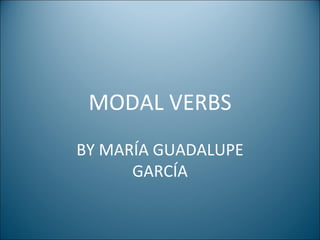
Modal Verbs
- 1. MODAL VERBS BY MARÍA GUADALUPE GARCÍA
- 3. 3. MODAL AUXILIARY VERBS ARE FOLLOWED BY THE SIMPLE FORM OF THE VERB.THE EXCEPTION IS OUGHT TO. EX: YOU MUST GO I ´LL HELP YOU YOU OUGHT TO SEE A DOCTOR 4. THEY HAVE NO INFINITIVES AND NO –ING FORMS. OTHER EXPRESSIONS ARE USED INSTEAD. EX: I CAN READ I HAVE TO STUDY I´D LOVE TO BE ABLE TO SKI I HATE HAVING TO GET EARLY ON WINTER MORNINGS 5. THEY DON´T USUALLY HAVE PAST FORMS. INSTEAD, WE CAN USE THEM WITH PERFECT INFINITIVES. EX: YOU SHOULD HAVE TOLD ME THAT YOU CAN´T RUN. YOU MIGHT HAVE COLLAPSED. OR WE USE OTHER EXPRESSIONS Ex: I HAD TO STUDY HARD IN SCHOOL.
- 5. “ Where´s Sue?” “ Im not sure. She may be at work” (= possibility). HAVE(GOT) TO,CAN,ALLOWED TO, HAVE TO AFFIRMATIVE AND NEGATIVE FORM I You We They Have to Don´t have to Work hard He She Has to Doesn´t have to work hard
- 6. INTERROGATIVE FORM HAVE TO IS USED TO EXPRESS OBLIGATION. IT EXPRESSES A GENERAL OBLIGATION BASED ON A LAW OR RULE, OR BASED ON THE AUTHORITY OF ANOTHER PERSON. IT IS IMPERSONAL. Ex: CHILDREN HAVE TO GO T SCHOOL UNTIL THEY ARE 16( A LAW) MOM SAYS YOU HAVE TO CLEAN YOUR ROOM BEFORE YOU GO OUT. ( MOTHER´S ORDER) DO YOU WE THEY I HAVE TO WORK HARD?
- 7. BE ALLOWED TO AFFIRMATIVE AND NEGATIVE FORM INTERROGATIVE FORM I YOU WE THEY AM ALLOWED TO ARE ALLOWED TO AREN´T ALLOWED TO PARK HERE HE SHE IS ALLOWED TO ISN´T ALLOWED TO PARK HERE AM I ALLOWED TO PARK HERE? ARE YOU WE THEY ALLOWED TO PARK HERE? IS HE ALLOWED TO PARK HERE?
- 8. CAN CAN IS A MODAL VERB. CAN AND BE ALLOWED TO EXPRESS PERMISSION CAN IS MORE INFORMAL AND USUALLY SPOKEN. Ex: YOU CAN BORROW MY CAR, BUT YOU CAN´T HAVE MY BOAT. YOU CAN´T COME IN HERE WITH THOSE MUDDY SHOES! YOU´RE ALLOWED TO USE A DICTIONARY FOR THIS TEST. SHOULD AND MUST FORM
